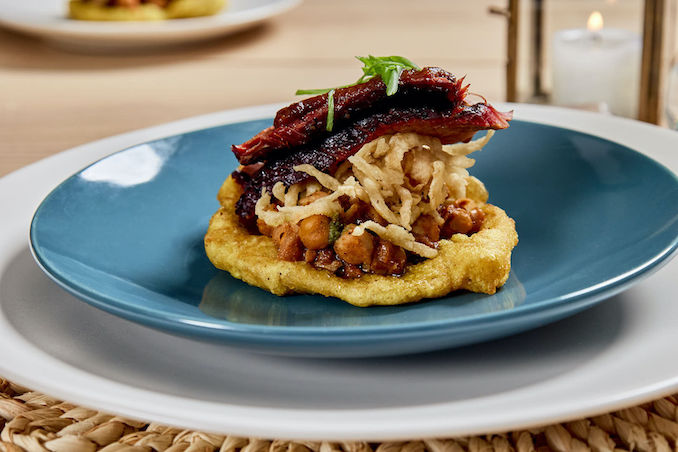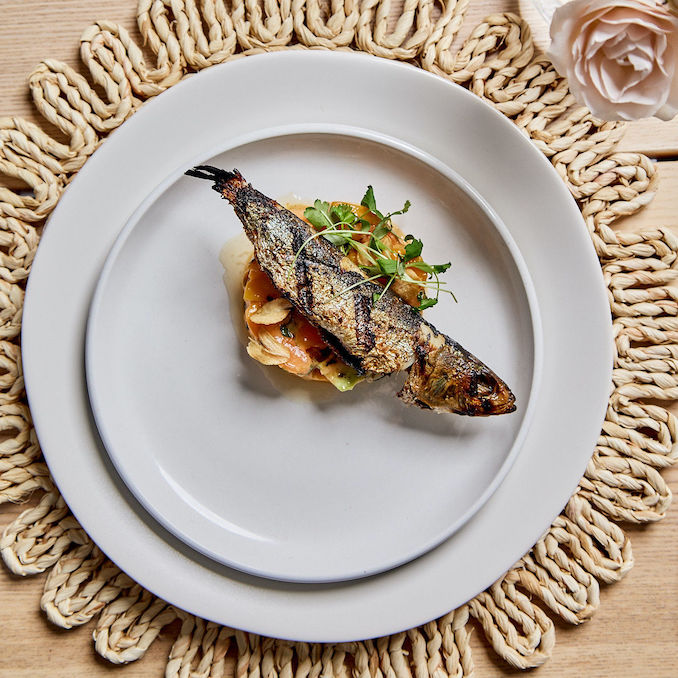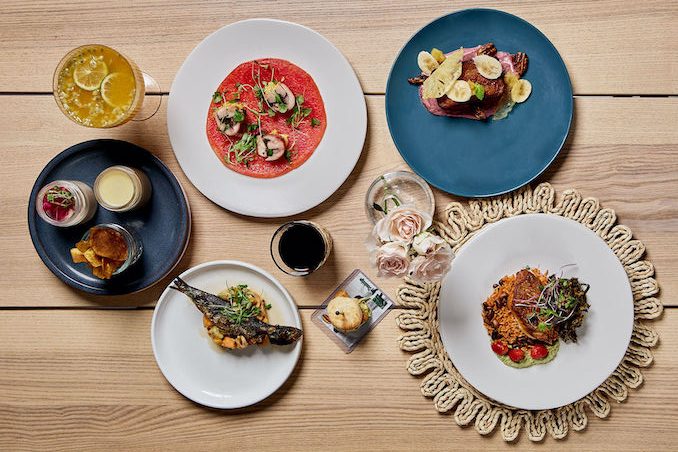Griot’s Table is a multi-sensory, Afro-culinary experiences that reclaim, celebrate and connect Black history to humanity’s history. Inspired by the Griot, a traditional West-African storyteller and musician, each of their themed events are meticulously designed to envelop guests in a tapestry of flavours, music, decor, and storytelling, grounded in Afro-history. Their dinners are not only a must-experience, they also aim to revolutionize how diners engage with ethnic food not just as a sensuous experience but as a historical phenomenon and an expression of identity.
The Team:
Bryan Birch is the Head Chef at Griot’s Table and former owner of Windup Restaurant on College Street. With over 20 years of experience in the culinary industry, Chef Bryan is driven by a mission to amplify Black culinary traditions, which he views as invaluable repositories of Black history and collective identity. Through his culinary pursuits, he seeks to demonstrate that dishes such as the Senegalese Yassa Chicken are just as sophisticated, prestigious, and valuable as dishes such as the French Coq au vin.
Aicha Toure, who is in charge of operations, is a self-proclaimed human rights defender and history enthusiast. An international development practitioner by day, she is passionate about food both as a political issue and a political tool. Her ultimate goal is to contribute to building a world where no one has to go to bed hungry.
Amanda Richards, creative director, is a self-proclaimed foodie; she is particularly interested in the preservation of Afro-diaspora traditional foodways. A public health professional by trade, she is also interested in issues of food justice and food sovereignty for marginalized communities in the GTA. A seasoned entrepreneur, she previously owned an event-planning organization.

We chat with Aicha Toure, co-founder of Griot’s Table to learn more…
Why are griots so important within the community?
Aicha: We are a storytelling species. Stories shape our belief systems, help us make sense of the world, and inform our self-perception. The transatlantic Slave trade and colonialism undermined Black people’s capacity to tell our stories and by extension shape our cultural identity. Our narratives and mythologies were replaced with reductive, and often dehumanizing stories, that have helped perpetuate white supremacist ideology.
Throughout pre-colonial Africa, there was a rich tradition of oral storytelling where stories were used as a means to transmit wisdom, instil social values, and provide a sense of purpose. As such, storytellers held a revered position in society as the custodians of collective memory and the keepers of ancient wisdom. Similar to past Griots, modern-day Griots continue this sacred tradition by crafting narratives that challenge misrepresentations and empower communities to define themselves. As a popular African proverb goes, “Until the lion learns how to write, every story will glorify the hunter”
What inspired the creation of the Griot’s Table experience?
Aicha: As someone who works in international development and is married to a Chef, I have always been interested in the role of food in supporting unequal structures within society. Throughout history, food has been used as a tool to subjugate, control native populations, and cement authority. Today food is still being used as a tool to reinforce unequal social hierarchies as evident with issues such as food deserts, malnutrition, and food dependency in some Global South countries.
Nevertheless, while food can be used to oppress it can also be used as a tool of resistance and decolonization. What and how we eat is a reflection of our history. Our foods tell our stories, and as such, they are essential to our collective liberation. Griot’s Table was born from a desire to reclaim and preserve Black stories and histories through food. Our events are more than a culinary experience; they embody acts of decolonization in their efforts to forge a connection between the narratives embedded in our foods and the broader struggle for equality.

Can you tell us about a recent event?
Aicha: On September 24th, 2023 we held an event titled “Anansi’s Odyssey inspired by the West African folklore character, Anansi the Spider. The experience sought to trace the trajectory of Anansi stories, by way of the transatlantic slave trade, from the Gold Coast (West Africa) to afro-communities in the Caribbean and the Americas where they remain popular until today. In West African folklore, Anansi is considered the God of wisdom and trickery with the ability to outsmart opponents stronger than him through cunning and wit. Using this backstory, the event sought to pay tribute to enslaved Black people’s capacity to triumph over formidable forces. The event was structured around a 5-course meal with each course symbolizing a juncture of Anansi’s journey from Ghana across the ocean to Trinidad & Tobago then moving North to Jamaica and eventually South Carolina. Central to the experience was the presence of a storyteller, reflecting the Black tradition of transmitting cultural values and beliefs through oral expression. In line with our mission to reclaim our stories, the menu not only featured the description of each dish but also delved into the historical context surrounding them. Lastly, the event’s napkins and menus were made with a print specially designed for the occasion by locally renowned Jamaican-Canadian artist, Janice Garel.
What can people expect at one of your beautiful and very special culinary experiences?
Aicha: We encourage people interested in attending our events to bring their whole selves and come with an open mind. The goal is to build bridges, learn from each other, and assert each other’s humanity through the long-held ritual of breaking bread. As the saying goes “It’s hard to remain enemies when you’ve broken bread together.”

Can you tell us about who has collaborated with Griot’s Table so far?
Aicha: We are a new organization so we haven’t had the opportunity to collaborate with many Griots; so far, we have worked with local storyteller Kesha Christie; local artist, vocalist, and choreographer, Trudy Lee Garel; and, local musician MellowDee. We are in talks with other Griots to collaborate on events this year. Follow us on IG for more information on upcoming events.
Griot’s Table’s mission is to help Black people reclaim and preserve their stories to build a more equitable society; therefore, we inherently gravitate towards individuals and organizations who share a commitment to this mission. In today’s world of increased access to information, anyone can become a Griot, all it takes is a desire to learn and an unwavering commitment to building a fairer world. You do not need to possess a doctorate or have millions of followers on social media to be a Griot, the essence of a Griot lies in genuine commitment to a cause.
Do you have a favourite story or legend that you enjoy sharing with others?
Aicha: The legend of Soundiata Keita, revered as the lion of Sogolon for his formidable strength. Soundiata, son of King Naré Maghann Konaté and Queen Sogolon Kondé, is believed to be the founder of the Mali Empire. Most of what is known of him was preserved through oral tradition. He is the subject of the Epic of Sundiata, an epic poem of the Malinke people that has been narrated by generation after generation of Griots since the 13th century. The epic retells the life story of Soundiata, who, despite being born with a physical disability making him the subject of mockery, goes on to become a great warrior. As someone who is always rooting for the underdogs this story greatly resonates with me; after all, who can resist the allure of a compelling comeback story?
When is the next event and what can guests look forward to?
Aicha: Our next event will take place on February 24th and it will be a commemoration of 50 years of Hip-hop. We wanted to celebrate an art form that has done so much in giving a voice to the voiceless, providing the wretched of the earth an opportunity to reclaim their narrative, assert their identity, and fight the power that be. The event, a cocktail-style party will take place at Riley Kitchen from 8:00 PM to 12:00 PM and include a The Bronx-inspired menu curated by Chef Bryan Birch and music by DJ Grouch. Tickets are currently on sale on Eventbrite and our IG page.
For more information, visit Griot’s Table’s Website: www.griotstableto.com




